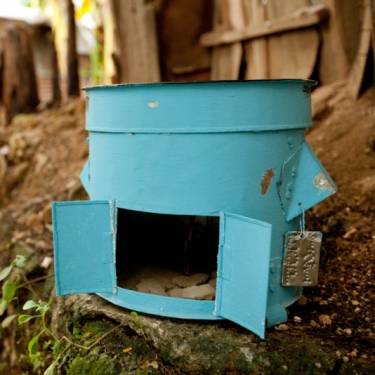 Haiti is a tough place to do business. The impoverished Caribbean nation ranks 181 of 190 countries analyzed by the World Bank. The cookstove business is tough, too. No one has built a profitable cookstove company at scale, even with subsidies. So why would anyone start a business making and selling cleaner cookstoves in Haiti?
Haiti is a tough place to do business. The impoverished Caribbean nation ranks 181 of 190 countries analyzed by the World Bank. The cookstove business is tough, too. No one has built a profitable cookstove company at scale, even with subsidies. So why would anyone start a business making and selling cleaner cookstoves in Haiti?
For Duquesne Fednard, the founder of D&E Green Enterprises, a cookstove manufacturer in Port-au-Prince, it’s partly about upending the conventional wisdom about his home country. “Haiti has been getting a bad rap,” he says. Fednard was close to giving up after the 2010 earthquake destroyed his small factory, until his workers persuaded him to keep at it. “They pinned their hopes on us,” he says. “It was my responsibility to see it through.”
His partner, Vahid Jahangiri, who is the deputy director of the nonprofit International Lifeline Fund, relished the challenge, too. Haiti was in “complete chaos” after the earthquake, and people desperately needed ways to cook, he told me. Lifeline first imported stoves from China and then employed a crew to pound them out by hand in Lifeline’s Port-au-Prince office. “If you wanted to make a phone call,” Jahangiri recalls, “it was impossible because everybody was banging on metal.”
D&E and Lifeline eventually joined forces to rebuild the D&E factory–an unusual partnership between a charity and a business. These days, they work with another improbable startup, called Carbon Roots International, that makes charcoal from agricultural waste. Eric Sorensen, the co-founder of Carbon Roots, says its goal is to make the equivalent of a Kingsford charcoal briquette that is cheaper and does less environmental damage than conventional wood-based charcoal.
Surely there are easier ways to make a living.
D&E Green Enterprises, Lifeline and Carbon Roots face daunting obstacles. They need to attract more customers, they need to raise money and they need to expand their operations to drive down their costs and achieve economies of scale. I haven’t seen any of them up close (my only visit to Haiti took place more than 35 years ago) but my research and interviews with Fednard, Jahangiri and Sorensen left me with a couple of impressions.
First, they are incredibly determined. Second, they are trying new ideas, testing and learning as they go. Bold, persistent experimentation is a good way to run a cookstove company in Haiti, or anywhere else, for that matter.
The undeniable benefits of efficiency
 Fednard, 39, grew up in Haiti, then spent 14 years studying and working in the US, earning a master’s in international affairs at Columbia and working in New York Mayor Bloomberg’s office aiding small business. While on a trip to Ghana, he saw improved cookstoves that reduce charcoal consumption because of their design and ceramic insulation. He returned to Haiti in 2009 to start D&E.
Fednard, 39, grew up in Haiti, then spent 14 years studying and working in the US, earning a master’s in international affairs at Columbia and working in New York Mayor Bloomberg’s office aiding small business. While on a trip to Ghana, he saw improved cookstoves that reduce charcoal consumption because of their design and ceramic insulation. He returned to Haiti in 2009 to start D&E.
D&E’s pitch to customers is simple. Its cookstoves, which cost between $8 and $15, save them money because they require less charcoal than the cheaper stoves, some sold for as little as $2, made by local artisans. They savings in fuel costs repays the investment in a stove in about four weeks, the company says. Nine of 10 customers are pleased with their stoves, Fednard told me.
D&E’s stoves also slow deforestation and reduce carbon emissions, and so the company has applied for carbon credits to help finance the stoves. Unfortunately, D&E’s charcoal stoves cannot be described as “clean” because they generate substantial amounts of indoor air pollution.
“For $20, we can move people to a much cleaner stove,” Fednard says. Those would burn ethanol or propane. But most Haitians struggle to pay for the improved charcoal stoves. “It’s hard to sell stoves into a market where so many have no income,” he says. Indeed.
D&E has been supported by U.S. AID, by Ashden, a British NGO, and by the InterAmerican Development Bank, among others. By far its most important backer has been Lifeline, a Washington, D.C., based nonprofit started in 2003 by Daniel Wolf, a human rights lawyer who, among other things, collected more than $240 million in awards for several hundred Americans take hostage by Iraq back in 1990.
 Since the Haitian earthquake, Lifeline has spent about $2.5 million on cookstoves in Haiti, with about $800,000 going to support D&E. Jahangiri, who has overseen cookstove projects under difficult circumstances in Uganda, Darfur and South Sudan, has shared his extensive knowledge with Fednard, helping to refine their designs and to do what they can to lower costs. One example: They are wrestling with the tradeoffs between local production, which creates jobs for Haitians, and buying components of the cookstoves from China, which could lower costs and drive sales.
Since the Haitian earthquake, Lifeline has spent about $2.5 million on cookstoves in Haiti, with about $800,000 going to support D&E. Jahangiri, who has overseen cookstove projects under difficult circumstances in Uganda, Darfur and South Sudan, has shared his extensive knowledge with Fednard, helping to refine their designs and to do what they can to lower costs. One example: They are wrestling with the tradeoffs between local production, which creates jobs for Haitians, and buying components of the cookstoves from China, which could lower costs and drive sales.
Cookstoves are more complicated than they seen, Jahangiri tells me. “How do you design a stove that is high power, low power, durable and affordable?” he says. “Can you design a Ferrari for $7?”
And any design needs to be adapted to local needs. “Learning Haitian rice and beans is a PhD in itself,” Jahangiri says.
Carbon Roots International, the charcoal firm, was originally created to make biochar, a soil supplement, to improve agricultural productivity in Haiti. But Sorensen and his co-founders Ryan Delaney and Hannah Erickson (who’s now his wife) found that Haitians were more interested in using charcoal for cooking than they were in growing more food. Haiti is often said to be one of the most deforested countries in the world, although there’s some debate about that. But there’s no doubt that a black market has developed in charcoal illegally imported from the Dominican Republic.
 Today, Carbon Roots makes charcoal out of sugar cane waste, which they buy from farmers and processors. “It’s a drop-in fuel replacement for traditional wood charcoal,” Sorensen says. Customers buy it, he says, because it costs less than conventional charcoal made from wood. “Ours is always sold cheaper,” he says.
Today, Carbon Roots makes charcoal out of sugar cane waste, which they buy from farmers and processors. “It’s a drop-in fuel replacement for traditional wood charcoal,” Sorensen says. Customers buy it, he says, because it costs less than conventional charcoal made from wood. “Ours is always sold cheaper,” he says.
The charcoal, which is sold under the brand Chabon Boul, is environmentally preferable to conventional charcoal because it comes from waste, not trees. The company says:
CRI estimates that each ton of green charcoal consumed by Haitian households offsets 6.7 tons of wood harvested from live trees. Accordingly, CRI estimates that each ton of green charcoal represents 8.8 tons of CO2 emissions avoided.
Carbon Roots now produces between three and five tons of charcoal a day, and Sorensen says the company would like to expand to make 20 tons a day. “We’re already the largest producer of charcoal in Haiti,” he says. “Demand far exceeds our ability to supply it.” The company’s single biggest funder has been U.S. AID, which gave Carbon Roots a $500,000 grant through its Development Innovation Ventures unit. Its first major grant came from Halloran Philanthropies.
An unfinished story
The good news is that D&E and Carbon Roots are both generating economic activity in a place that sorely needs it. D&E employs about 50 full-time people and delivers income to another 65 or so distributors who regularly buy cookstoves for reselling; the company is making about 1,200 cookstoves a month. Carbon Roots also employs about 50 people, and has a network of about 30 distributors.
But both companies will need more investment to become profitable, without grants or subsidies. They are awaiting the results of a study by the Global Alliance for Clean Cookstoves that is expected to come up with a five-year “clean cooking plan” for Haiti by early next year. The study is being financed by the government of Canada, which “has indicated a strong interest in supporting implementation of the plan,” the alliance says.
So this is very much an unfinished story. If D&E and Carbon Roots gain support from governments, philanthropy or even private investors, and grow into sustainable and profitable businesses, that will be cause for celebration. If not, they’ll become one more sad chapter in the history of Haiti, and in the cookstove sector.

Thank you Mark. Adam, we hope that Canadian investment truly comes into the hand of the right people who actually care and want to make a true impact in Haiti.
LikeLike
ILF and Carbon Roots are both doing great things–it’s a shame that the synergy of fuel companies and stove companies working together isn’t leveraged more often. Thank you for telling this story, Marc.
LikeLike